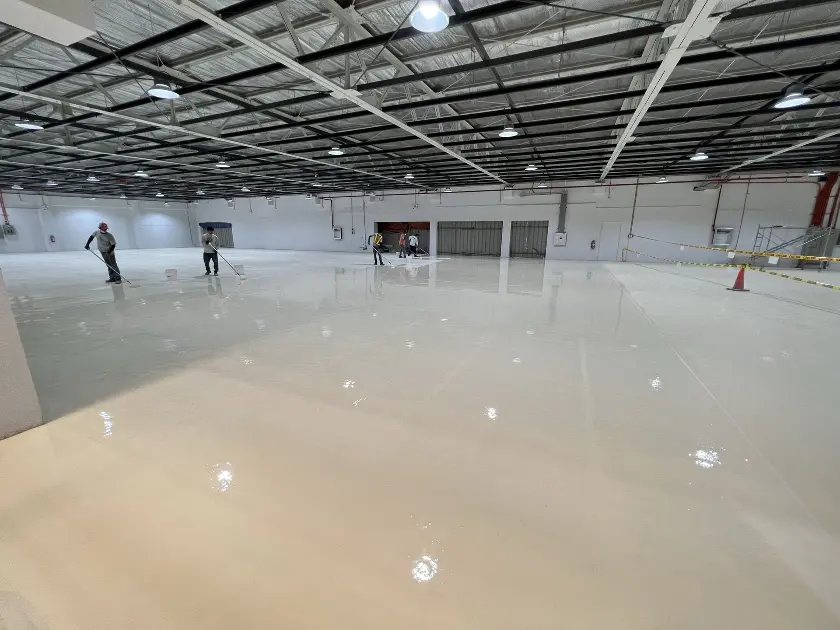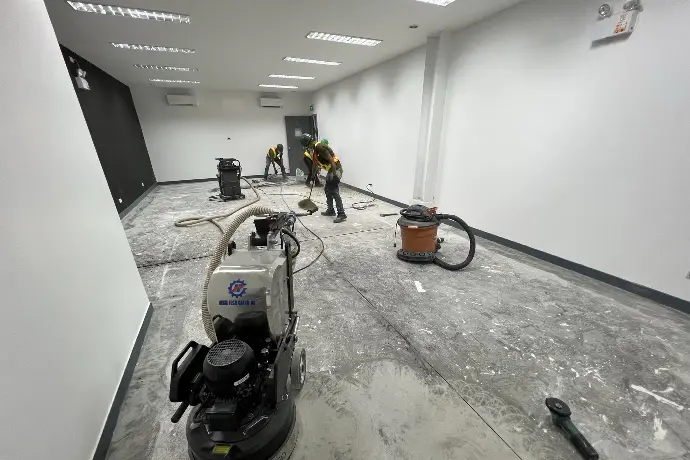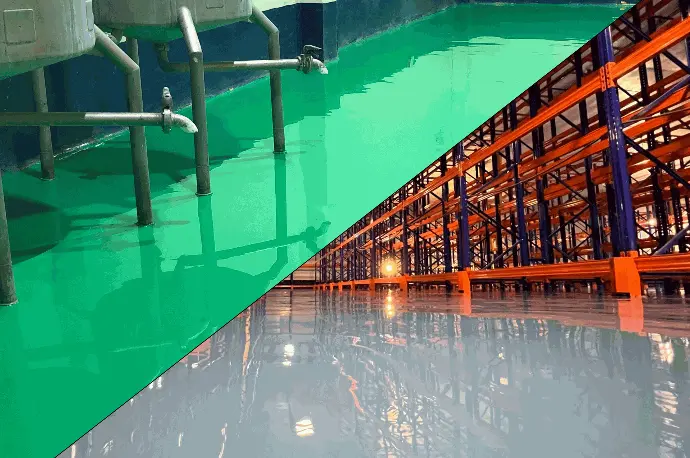
3 Types of Epoxy: Solvent-based, Water-based & 100% solids
Published on December 2023
Epoxy Resin in general is known for being high-build, durable, and chemical-resistant but different epoxy types can have varying characteristics depending on the formulation of the epoxy. In fact, you epoxy floor coating is likely one of three types: water-based epoxy, solvent-based epoxy, and 100% solids epoxy. Each type offers specific advantages in varying environments and understanding the differences between them can help you decide which type of epoxy to choose for your flooring system.
Solvent-based Epoxy
The first type of epoxy coating is the solvent-based epoxy. It was initially used in construction as a sealer, coating, and, most popularly, as an adhesive due to its excellent adherence to a wide range of surfaces. It eventually became a popular floor coating option due to its durability, cost-effectiveness, and its attractive glossy finish. Besides those characteristics, it is also more resistant to petroleum contaminants in the concrete surface, making it an ideal option for the automotive industry and similar spaces that experience heavy car traffic such as parking lots. Despite these advantages, however, using solvent-based epoxy also has its disadvantages. Unlike other types of epoxy, solvent-based epoxy would characteristically have high Volatile Organic Compound (VOC) content which can be a health hazard to anyone working with it while it hasn't fully cured yet. It is even more dangerous in confined spaces due to the toxic fumes it creates that get trapped without proper ventilation.
It is referred to as the traditional epoxy due to it being the first and most popular option of the three epoxy types when epoxy products started to become widespread in the market. This was until aggressive restrictions and regulations on products with high VOC content started to be implemented by governments around the world after more awareness for its harmful effects were raised. Some solvent-based epoxy products are still available in the market, however, they are likely formulated with less VOC content and, even then, it depends on the local regulations in place whether or not you can use a solvent-based epoxy for your project.
Water-based Epoxy
The second type is the water-based epoxy coating. This type of epoxy is the easiest to install relative to the other types of epoxy. This is because it has a longer pot life and curing time, is purchased as ready-to-use, and can do wet surface applications—it doesn't require the surface to be completely dry at the moment of application but there should still be no leaks or constant sources of moisture present. Unlike solvent-based epoxy, water-based epoxy do not emit harmful fumes and bad odor due to having little to no VOC content. Another advantage of this epoxy type is that it's also the least expensive option out of the three, making it an ideal option for smaller and less demanding projects such as residential or personal projects, Unfortunately, water-based epoxy is the least durable and least chemical-resistant option out of the three which means it is not a recommended flooring option for industrial or commercial applications that require a level of durability that can handle heavy foot traffic and machinery.
100% Solids Epoxy
The last type of epoxy is the 100% solids epoxy. This epoxy type is the most durable of the three with a lifespan of about 5 to 20 years depending on the concrete profile, environment, and correct application. Because it has a composition of 100% solids, by definition, this epoxy type has no solvents mixed into it allowing it to produce thicker dry coatings and be more durable. Because it has no solvents, This epoxy type does not have a portion of its composition that evaporates while the epoxy is curing which is why the thickness it has while the coating is wet (WFT) remains the same even after it dries (DFT). Another advantage brought about by the composition of this epoxy type is that it is more resistant to chemicals, stains, impact, and abrasion.
Because of its many advantages and attractive characteristics, it wouldn't be surprising for this type of epoxy to be the most popular choice in the market but the main drawback of this option is its high cost relative to solvent-based and water-based epoxy. other disadvantages of this epoxy type is the difficulty of its storage and installation. With a pot life of about 30 minutes, a 100% solids epoxy must be mixed, poured, spread out, and cleared of imperfections— primarily air bubbles—all within that time frame before the epoxy coating starts becoming less viscous—it's self-leveling properties is no longer present once it starts hardening. Because of this, it's recommended that 100% solids epoxy is applied by trained flooring professionals to avoid mistakes and additional repair costs. These characteristics discourage the use of this epoxy type by untrained individuals for home or personal projects where more affordable and easy-to-apply options are available.
Solvent-based Epoxy vs Water-based Epoxy vs 100% Solids Epoxy
Solvent-based Epoxy | Water-based Epoxy | 100% Solids Epoxy | |
Thickness | 2 - 3 mm | 1.5 - 3 mm | 10 - 15 mm |
Application | Commercial and industrial applications | Residential and personal projects | Industrial applications that suffer great losses if operations stop |
Walkable | 24 - 72 hours | 24 - 48 hours | 12 - 18 hours |
Heavy traffic | 7 - 10 days | 3 - 7 days | 36 - 72 hours |
Surface Preparation and Installation
Flooring projects can use the best epoxy coatings in the market and still be susceptible to defects and problems in their final flooring. This can be due to several reasons such as concrete surface defects, application errors, an unsecured flooring area, and other factors that can be overlooked by individuals that are untrained in epoxy floor coating solutions. This is why surveying and surface preparation are an important step in any floor installation project. The complex properties and requirements of epoxy floor applications understandably make flooring experts a reliable and cost-effective option for all kinds of applications whether it be residential, commercial, or industrial.
Want to ensure the durability and effectiveness of your floor system installation? Get in touch with our flooring experts who will guide you through the options available to you and flooring systems tailored for your needs.
Tags: epoxy, epoxy resin, epoxy paints, epoxy floor painting, epoxy floor, epoxy floor coating, epoxy coating, self leveling epoxy, water-based epoxy, solvent-based epoxy, industrial epoxy flooring
Suggested articles
Common Mistakes in Epoxy Applications
January 2024
Epoxy coating vs Self-leveling epoxy
January 2024
Contact us
Durability You Can Stand On
Request a quote or inquire about our services further by clicking the button below


